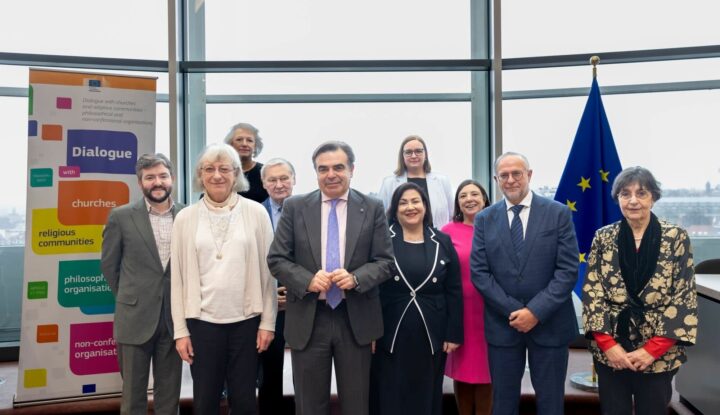In these unstable and uncharted times, Europeans and the EU (as an institution embodying European values), finds itself at a crossroads. Today I spoke at the EU Commission as President of Humanists International to discuss what’s next for Europe and the values essential for peace, human happiness, and progress. Here’s what I said:
Although the humanist movement is indeed a global one and humanist values are present all around the world, we do have our strongest presence in Europe. Humanists International itself was founded here, in Amsterdam in 1952, and our values have ancient roots in European soil. I want to say immediately that, in humanists, the European Union will always have an ally for the defence of the values that we share which include the rule of law, of order, and of stability – stability is absolutely essential for peace, for human happiness, and for human progress, for the good life and for the good society. Without stability we have nothing else and that is the lesson of history.
It is obvious that stability is necessary, that there are strong forces of instability in our region and world, and that a geopolitical Europe is a logical response in the interests of security. It’s absolutely true that a rules based and rule of law based order are important principles. But stability must intersect with and be fed by, values.
There can be no stability without peace and there can be no peace without solidarity and justice. So the question is has the Union lived up to its own values of solidarity, that it shares with humanists? The principle of solidarity for humanists is based solely in the recognition of the intrinsic worth and dignity of every individual, regardless of their background or circumstances.
The Covid-19 pandemic is a good example of instability averted. Through a balanced and unified approach, the EU successfully managed to address a crisis by ensuring equitable access to vaccines for all Member States and by designing initiatives like the Recovery and Resilience Facility.
But, the commitment to solidarity must extend beyond the EU’s borders. Today’s conflicts, not least in Ukraine and Gaza, underscore the importance of extending our support to those under attack whether by terrorists or lawless regimes. We must respond to these conflicts guided by the principles of cooperation and compassion that define our European identity.
The unprecedented numbers of people fleeing conflict and seeking a better life continues to test our commitment to solidarity within the EU. Is the Pact on Migration and Asylum – a political achievement for sure – truly completely as reflective of the values we hold. Have human rights always been at the centre of negotiations on EU asylum reforms, recognising the inherent humanity and dignity of those seeking refuge on our shores?
Only by upholding these values can we find long lasting stability – and these values must be manifest, not just spoken about. It is also crucial that the Union effectively communicates about its fundamental values to citizens, in the run up to to the European elections. In light of the rise in the popularity of far-right movements, it is even more important to strongly convey the message of solidarity and unity and equality.
In civil society humanists will certainly be your allies in this. We recognise the important role we play in bridging the gap between institutions and citizens. We remain steadfast in our commitment to promoting the importance of democracy, solidarity, and European values, contributing to the creation of a more cohesive and democratic Union.
